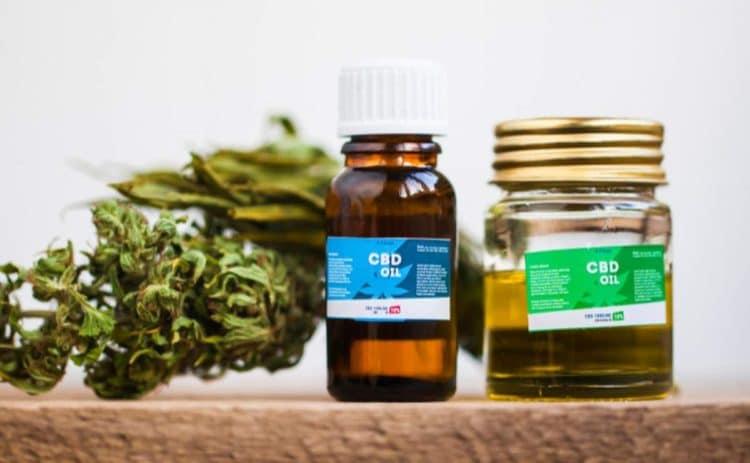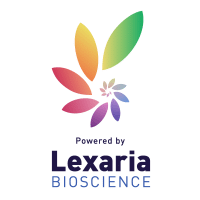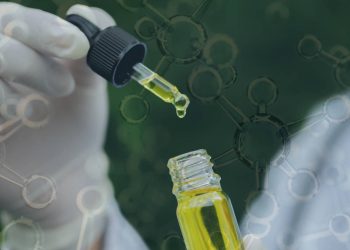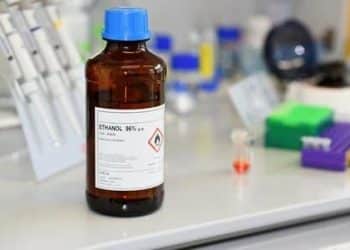As we know, the lipophilic nature of cannabinoids is the crux of the issue regarding their low bioavailability as it means they are inherently unable to dissolve into water, obviously our body’s main constituent. Funny enough, antiviral drugs tend to have the same problem.
It’s no wonder, then, that Lexaria Bioscience, a leader in oral drug delivery and fat-soluble drugs, is pushing the envelope of both those fields, in addition to others like nicotine and pharmaceuticals, and even the field that has practically become one with everyday life — COVID 19 — with its patented DehydraTECH technology.
“We coined the name DehydraTECH to recognize the fact that our patented formulation and processing methodology is rooted in effecting a molecular association between any given lipophilic bioactive substance of interest (e.g., cannabidiol (CBD), tetrahydrocannabinol, antiviral drugs, etc.) and certain long chain triglyceride rich oils (e.g., high oleic sunflower oil) together with certain emulsifying substrate powders that is enabled by way of our dehydration processing technique. Hence the term ‘DehydraTECH,’” Chris Bunka, Lexaria’s CEO, explains.
Antiviral drugs, especially as they relate to the fight against COVID-19, have two main shortcomings that stem from their low bioavailability and make for a case of pick your poison: side effects or increased cost and a lack of stability:
“These repurposed drugs have to be administered in very high doses which can result in unwanted side effects, or via injection for easier access to the bloodstream, circumventing the gastrointestinal absorption limitations,” Bunka says.
“However, injectable administration requires the involvement of a medical practitioner, which may not be easily accessible for the masses and usually increases a medicine’s cost. It also often means that the product format isn’t as stable, or requires special storage and handling considerations not required for oral medications.”
The fact that Lexaria’s expertise could also be applied to an unprecedented fight against a novel virus speaks volumes to the advancement and legitimacy of cannabis science as a whole.
“Our research is indeed a testament to how high-quality scientific findings from the hemp/cannabis CPG [consumer packaged goods] industry can be applicable to the broader pharmaceutical industry, as we are now investigating for certain oral antiviral drug therapies,” Bunka says.
“High-quality scientific findings” is not an overstatement by any stretch of imagination, as they are quantified by impressive numbers from both in vitro and in vivo animal and human studies.
In a 2018 randomized, double-blind, placebo-controlled, human clinical study, DehydraTECH delivered 317% more CBD to the blood than the control formulation at the 30-minute mark. Lexaria also conducted an in-house, pre-clinical study in 2019, which showed that DehydraTECH increased CBD absorption in rats by up to 1098% compared to formulations using medium chain triglycerides from coconut oil.
In addition to improving bioavailability, DehydraTECH also reduces onset time, the other major drawback of ingestible CBD products, from 1-2 hours to 15-20 minutes. In other words, Lexaria’s invention has game-changing potential to make ingestion a worthy contender for the ultimate mode of CBD consumption.
But as mentioned above, Lexaria’s personnel have expertise in oral drug delivery, so DehydraTECH’s benefits aren’t limited to edibles. Sublingual CBD consumption, which happens through products like oils and sprays administered under the tongue, has serious advantages like high bioavailability and rapid onset time, however, the bitter taste isn’t one of them. In fact, it’s often masked by sweeteners some of which may have negative health impacts of their own. People who prefer sublingual CBD consumption will be happy to know that DehydraTECH eliminates taste and odor.
“An ancillary benefit of DehydraTECH is that the particular fatty acid-rich oils that we generally work with, like high oleic sunflower oil, have a tendency to impart powerful flavor-masking properties since long-chain fatty acids are known to block [or rather occupy] receptors in the oral and olfactory cavities [1] that otherwise detect bitter aromatic chemicals common in cannabinoid extracts,” Bunka explains.
DehydraTECH-based cannabinoid formulations, therefore, can be highly palatable without having to resort to sweeteners to mask unwanted flavor notes.
In the future, Lexaria is planning on conducting “in vivo studies using fluorescently tagged bioactive drug compounds formulated using DehydraTECH to precisely follow their absorption, distribution, metabolism, and elimination pathways in the body following ingestion.”
For now, the company has gathered and published preliminary scientific data in support of their theoretical mechanism of action revolving around fatty acids like high oleic sunflower oil protecting the CBD payload from “hostile stomach conditions.” This process expedites CBD to the small intestine where nutrient bio-absorption occurs, before transporting it to “the systemic circulation by one of two pathways – hepatic or lymphatic – depending on the type of fatty acid(s) chosen for each formulation.”
Pinning down the exact mechanism of DehydraTECH and tracking its path in our bodies without a shadow of doubt is about satisfying scientific curiosity and providing a foundation to build on in the future. But either way, for now, Lexaria has the numbers on its side.
References:
- Fushiki T. Why fat is so preferable: from oral fat detection to inducing reward in the brain. Biosci Biotechnol Biochem. 2014;78(3):363-369. Journal Impact Factor = 1.063; Times Cited = 14













